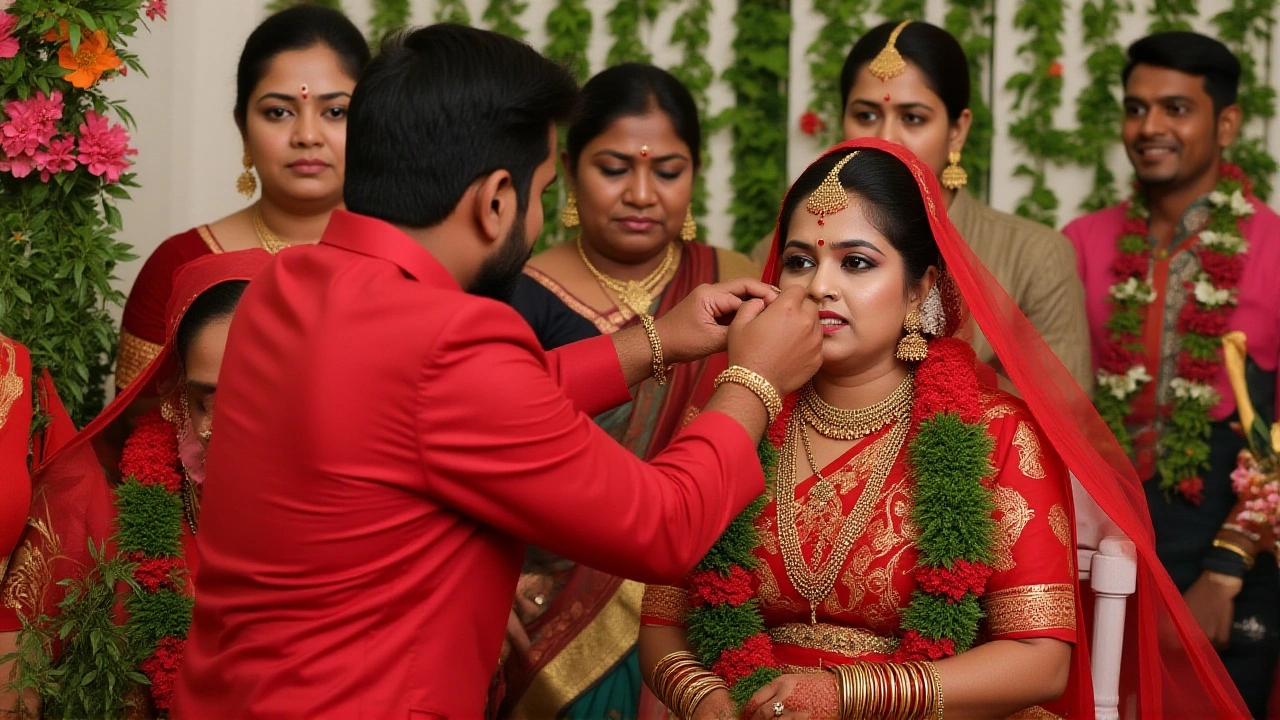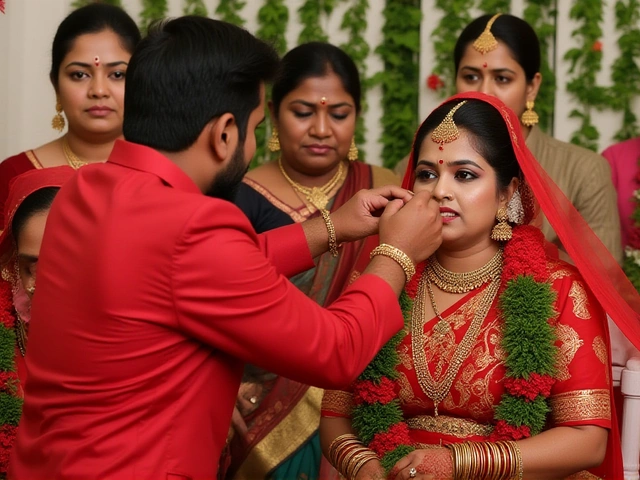At 4:00 AM on June 9, 2025, in a quiet courtyard of a home in Kaimur district, Bihar, a wedding ended before it began—not with a fight, not with a disagreement over dowry, but with a trembling hand. The Sindoor Daan, the sacred moment when vermilion is applied to a bride’s forehead to signify her marital status, was interrupted when the groom’s hand shook uncontrollably. The bride, unnamed in all reports, stepped back, declared, "The boy is mad," and walked away. The ceremony, which had progressed through all prior rituals including Dwarchar and Barnaat, halted instantly. No one saw it coming.
The Ritual That Can Break a Marriage
In rural North India, the Sindoor Daan isn’t just a formality—it’s the spiritual point of no return. Unlike Western weddings where "I do" seals the deal, in traditional Hindu ceremonies like this one in Kaimur district, the sindoor is the moment the bride becomes suhaagini—a married woman. A steady hand isn’t just preferred; it’s believed to reflect mental clarity, divine blessing, and emotional stability. A shake? That’s not just awkward—it’s interpreted as an omen, a sign of instability, even madness.
"It’s not about the hand trembling," said a local priest from Bhabhua who spoke on condition of anonymity. "It’s about what people believe the trembling means. In our villages, if the groom can’t hold the sindoor steady, it’s as if the gods are warning the bride: this man is not grounded. You don’t marry someone who can’t even control his own body in the most sacred moment."
The Financial Fallout
The groom’s family, who had traveled from within the same district with a full baraat—drummers, dancers, and decorated horses—now face ruin. According to the groom’s father, the marriage was agreed upon for ₹1,00,000. The bride’s family paid ₹90,000 upfront. The groom’s side spent every rupee.
- ₹30,000 on gold jewelry for the bride
- ₹20,000 on bridal and family sarees
- ₹10,000 on a DJ and live music for the baraat
- ₹30,000 on transportation, fuel, and lodging for guests
"We didn’t save a single rupee," the father told reporters. "We paid the jeweler in cash. The saree shop doesn’t take returns. The DJ already performed. The trucks are empty. We’re left with nothing but shame."
That shame is real. In Kaimur, where social reputation is tied to family honor, a canceled wedding—especially one that ends mid-ritual—is a stigma that lingers for years. Relatives say neighbors are already whispering. "They’re asking if the boy has epilepsy," said one anonymous cousin. "Or if he was drunk. Neither is true. He was just nervous."
Why the Hand Shook
The groom, also unnamed, gave a simple explanation: "We came for the wedding. At the time of applying sindoor, my hand shook. The girl ran away saying the boy is mad."
A relative offered more context: "All rituals were completed. Just during sindoor, the groom’s hand shook, maybe due to noise or pressure."
The early morning hour, the blaring music from the baraat, the weight of dozens of eyes, the sudden silence after the final chant—it’s a perfect storm of sensory overload. In cultures where rituals are performed with intense emotional gravity, even the most composed can falter. The groom wasn’t ill. He wasn’t drunk. He was overwhelmed. But in this context, that doesn’t matter.

The Bride’s Side: Silence and Solidarity
The bride’s family didn’t argue. They didn’t ask for time to reconsider. They didn’t call for mediation. They demanded their money back. And they got it—politely, firmly, and without apology.
"They didn’t say a word to us," said a neighbor who watched the scene unfold. "They just stood there, quiet. Then they asked for the cash. The groom’s father said, ‘We spent it all.’ They just nodded. Left. No shouting. No drama. Just… gone."
That silence speaks volumes. In many parts of Bihar, women’s consent—even in arranged marriages—isn’t just a formality. It’s the final, unspoken veto. If the bride says no, even at the last second, the family backs her. No pressure. No guilt. No "but we spent so much." The tradition, for all its rigidity, still gives the bride agency at the moment of truth.
What Happens Now?
No police complaint was filed. No court case is pending. The Bhabhua Police Station has no record of the incident. But that doesn’t mean it’s over.
Local elders are meeting. Some suggest the groom’s family should return at least the value of the jewelry—₹30,000—as a goodwill gesture. Others say the entire ₹90,000 must be returned, since the marriage never legally concluded. Meanwhile, the groom’s family is selling off a small plot of land to cover debts.
"This isn’t just about money," said Dr. Meena Verma, a sociologist from Patna who studies rural marriage customs. "It’s about how we treat mental vulnerability in sacred spaces. We expect perfection in rituals, but we never ask: What if someone is scared? What if they’re anxious? What if their body betrays them? We punish the tremor, not the fear behind it."

More Than a Wedding Gone Wrong
This isn’t the first time a wedding has collapsed over ritual missteps. In 2022, a groom in Uttar Pradesh fainted during the pheras, and the bride’s family canceled the marriage. In 2020, a bride in Jharkhand refused to walk around the fire because the groom’s shoes were black—a color considered inauspicious. Each time, the same pattern: tradition as law, emotion as omen, and financial ruin as consequence.
But this case is different. The groom didn’t lie. He didn’t cheat. He didn’t break a promise. He just shook. And in a world where control is everything, that’s enough.
Frequently Asked Questions
Why is the sindoor ritual so critical in Hindu weddings?
The sindoor application marks the official transition of a woman into married status in North Indian Hindu tradition. It’s believed to symbolize the husband’s commitment and the wife’s new spiritual identity. A steady hand during application is seen as a sign of mental and emotional stability—any tremor is interpreted as a bad omen, sometimes even as divine warning. Unlike the exchange of rings in Western weddings, sindoor is irreversible and culturally binding.
Why didn’t the bride’s family try to negotiate after the groom’s hand shook?
In many rural communities in Bihar, a bride’s immediate refusal carries immense weight—even if it’s spontaneous. Families respect her autonomy at that critical moment. Pushing her to proceed would be seen as coercive and disrespectful. The bride’s silence afterward, and the family’s demand for refund, reflects cultural norms where consent is non-negotiable, even in arranged marriages.
Can the groom’s family be legally forced to return the money?
Legally, since the marriage was never completed—no pheras, no signature on the marriage register—there’s no binding contract. But civil courts rarely intervene in such cases unless fraud or coercion is proven. Most disputes are settled through village panchayats. The groom’s family may face social pressure to return funds, but no formal legal action is likely unless the bride’s family files a civil suit for unjust enrichment.
Is this a common occurrence in Bihar?
Not common, but not unheard of. Between 2018 and 2024, at least seven wedding cancellations in Bihar were directly linked to perceived ritual failures—trembling hands, dropped garlands, or incorrect chanting. None made national headlines. But in local communities, these incidents become cautionary tales. The fear isn’t just of failure—it’s of being seen as cursed or unstable.
What’s the groom’s future like after this?
Socially, he’ll face stigma for months—if not years. Families will hesitate to propose matches, fearing "bad luck" or hidden instability. He may need to relocate or wait years before another proposal. Medically, if he has no history of tremors, this could be a one-time stress reaction. But in a community that reads signs into every gesture, recovery isn’t just personal—it’s cultural.
Could this have been avoided?
Possibly. If the groom had been given time to rest before the ritual, or if the music had been lowered, or if elders had gently reassured him, the outcome might have been different. But in traditional ceremonies, spontaneity is sacred. There’s no rehearsal for the sindoor. It’s meant to be raw, real, and unscripted—making it both beautiful and terrifying.





